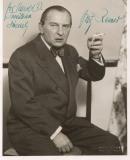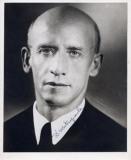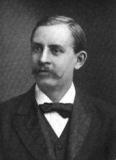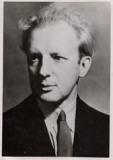
Frederick Martin "Fritz” Reiner (December 19, 1888 - November 15, 1963) was a prominent conductor of opera and symphonic music in the twentieth century. Reiner was born in Budapest, Hungary to a secular Jewish family that resided in the Pest area of the city. After preliminary studies in law at his father’s urging, Reiner pursued the study of piano, piano pedagogy, and composition at the Franz Liszt Academy. During his last two years there his piano teacher was the young Béla Bartók. After early engagements at opera houses in Budapest and Dresden where he worked closely with Richard Strauss, he moved to the United States of America in 1922 to take the post of Principal Conductor of the Cincinnati Symphony Orchestra. He remained until 1931, having become a naturalized citizen in 1928, then began to teach at the Curtis Institute in Philadelphia, Pennsylvania, where his pupils included Leonard Bernstein and Lukas Foss. He conducted the Pittsburgh Symphony Orchestra from 1938 to 1948 and made a few recordings with them for Columbia Records, then spent several years at the Metropolitan Opera, where he conducted a historic production of Strauss's Salome in 1949, with the Bulgarian soprano Ljuba Welitsch in the title role, and the American premiere of Igor Stravinsky's The Rake's Progress in 1951. He also conducted and made a recording of the famous 1952 Metropolitan Opera production of Bizet's Carmen, starring Rise Stevens. The production was telecast on closed circuit television that year. At the time of his death he was preparing the Met's new production of Wagner’s Götterdämmerung.
In 1947, Reiner appeared on camera in the film Carnegie Hall, in which he conducted the New York Philharmonic Orchestra as they accompanied violinist Jascha Heifetz in an abbreviated version of the first movement of Tchaikovsky's violin concerto. Years later, Heifetz and Reiner recorded the full Tchaikovsky concerto for RCA Victor in Chicago.
Even though his music-making had been American-focused since his arrival in Cincinnati, Reiner became active in Europe after the Second World War. When he became music director of the Chicago Symphony Orchestra in 1953 he had a completely international reputation. By common consent, the ten years that he spent in Chicago mark the pinnacle of his career, and are best-remembered today through the many landmark, stereophonic recordings he made in Chicago's Orchestra Hall for RCA Victor from 1954 to 1962. His last concerts in Chicago were in the spring of 1963. 
Dimitri Mitropoulos (1 March 1896 – 2 November 1960), was a Greek conductor, pianist, and composer. Mitropoulos was born in Athens, the son of Yannis and Angeliki Mitropoulos. His father owned a leather goods shop at No. 15, St Marks Street. He was musically precocious, demonstrating his abilities at an early age. From the ages of eleven to fourteen, when Mitropoulos was in secondary school, he would host and preside over informal musical gatherings at his house every Saturday afternoon. His earliest acknowledged composition - a sonata for violin and piano, now lost - dates from this period.
He studied music at the Athens Conservatoire as well as in Brussels and Berlin, with Ferruccio Busoni among his teachers. From 1921 to 1925 he assisted Erich Kleiber at the Berlin State Opera and then took a number of posts in Greece. At a 1930 concert with the Berlin Philharmonic, he played the solo part of Prokofiev's Piano Concerto No. 3 and conducted the orchestra from the keyboard, becoming one of the first modern musicians to do so.
Mitropoulos made his U.S. debut in 1936 with the Boston Symphony Orchestra, and he later settled in the country, becoming a naturalized citizen of the United States in 1946. From 1937 to 1949, he served as the principal conductor of the Minneapolis Symphony Orchestra (now known as the Minnesota Orchestra).
In 1949 Mitropoulos began his association with the New York Philharmonic, the peak of his orchestral career. He was initially co-conductor with Leopold Stokowski, and became the sole music director in 1951. Mitropoulos recorded extensively with the Philharmonic for Columbia Records and sought to reach new audiences through appearances on television and conducting a week of performances at the Roxy Theatre, a popular movie theatre in New York. Mitropoulos expanded the Philharmonic's repertoire, commissioning works by new composers and championing the symphonies of Gustav Mahler. In 1957 he was succeeded as the Philharmonic's conductor by a protégé, Leonard Bernstein.
In addition to his orchestral career, Mitropoulos was an equally important force in the operatic repertoire. He conducted opera extensively in Italy and from 1954 until his death in 1960 was the principal conductor of the Metropolitan Opera in New York, although the Met did not officially use that title at the time. His musically incisive and dramatically vivid performances of Puccini, Verdi, Richard Strauss and others remain models of the opera conductor's art. The Met's extensive archive of recorded broadcasts preserves many of these fine performances.
Mitropoulos's series of recordings for Columbia Records with the New York Philharmonic included a rare complete performance of Alban Berg's Wozzeck. Many of these have been reissued by Sony Classics on CD, including most recently his stereo recordings of excerpts from Prokofiev's Romeo and Juliet. For RCA he recorded with the Minneapolis Symphony during the 78-rpm era. He was also represented on the Cetra label, most notably with an early recording of Richard Strauss's Elektra.
He was noted for having a photographic memory (which enabled him to conduct without a score, even during rehearsals) and for his monk-like life style due to his deeply religious, Greek Orthodox beliefs.
Mitropoulos never married. He was "quietly known to be homosexual" and "felt no need for a cosmetic marriage".[2] Among his relationships reportedly was one with Leonard Bernstein.[3]
He died in Milan, Italy at the age of 64, while rehearsing Gustav Mahler's 3rd Symphony. One of his very last recorded performances was Verdi's La forza del destino with Giuseppe Di Stefano, Antonietta Stella and Ettore Bastianini at Vienna on 23 September 1960. A recording exists of the performance of Mahler's 3rd Symphony given by Mitropoulos with the Cologne Radio Symphony on 31 October 1960, just two days before his death. 
Frederick Stock (November 11, 1872 - Jülich, Germany - October 20, 1942 - Chicago, Illinois, USA) The respected German-born American conductor and composer, Frederick (actually: Friedrich August) Stock, began studying the violin with his father, a bandmaster in the German army. In 1886, at the age of 14, he won a scholarship to the Cologne Conservatory, where he studied violin with G. Japha, theory and composition with Engelbert Humperdinck, Franz Wüllner, and Gustav Jensen (the famous conductor Willem Mengelberg was among his classmates). Upon his graduation in 18912 (or 18903 or 18871), Stock joined the Cologne Municipal Orchestra as a violinst and played from 1891 to 1895 under conductors such as Johannes Brahms, Peter Tchaikovsky, and Richard Strauss.
In 1895, Stock met with Theodore Thomas, director of the then fledgling Chicago Orchestra and the man who was to have a decisive impact on Stock's future. Thomas, who was then visiting Germany in search of recruits for his newly organized Chicago Orchestra, auditioned Stock and gave him a position as violist in the orchestra. Thomas soon realized, however, that his new violist was also a very talented conductor and in 18993 (or 19012 or 4 years later1), Stock was promoted to assistant conductor. Upon Theodore Thomas's death in January 1905, Stock was appointed as acting conductor, while the Orchestral Association began a search for a permanent replacement. Under Stock's baton, the Orchestra premiered his symphonic poem Eines Menschenlebens Morgen, Mittag und Abend (A person's lifetime: morning, noon, and evening), on April 7 and 8, 1905; the score was dedicated to Thomas and the Orchestra. The Chicago Orchestra's board of directors failed to persuade Gustav Mahler, Hans Richter, Felix Weingartner, Karl Muck, and Felix Mottl, among others, to take over the position. Only then, on April 11, 1905, the trustees of the Orchestral Association met: "Frederick Stock unanimously elected Conductor. Trustees voted that the Orchestra should now be known as 'The Theodore Thomas Orchestra.'" (In February 1913, the name of "The Theodore Thomas Orchestra" was changed simply to "Chicago Symphony Orchestra," in the belief that it would be easier to solicit funds for an institution that bore the name of the community.) In 1905, the Orchestra began performing at Ravinia Park, appearing semiregularly through August 1931, after which the Park fell dark under the Great Depression. The Chicago Symphony Orchestra helped to inaugurate the first season of the Ravinia Festival in August 1936. In 1919 Frederick Stock became a naturalized American citizen. During the 1919-1920 season he inaugurated a regular subscription series of youth concerts as well as the Civic Orchestra of Chicago, a training orchestra. He also further developed the Popular Concert series, which featured a wide range of music from Tchaikovsky's Nutcracker to Wagner overtures and Strauss waltzes. As a conductor, Frederick Stock was extremely competent, even though he totally lacked that ineffable quaify of making orchestral music a vivid experience in sound; but he had the merit of giving adequate performances of the classics, of Wagner, and of the German Romantic school. He also programmed several American works, as long as they followed the Germanic tradition. Under his direction, the Chicago Symphony Orchestra became one of America's top orchestras, developing a distinctive brass sound that can already be heard in the orchestra's first recordings. An enthusiast of modern music, Stock championed the works of many then modern composers including G. Mahler; Richard Strauss; Igor Stravinsky, Sergei Prokofiev, who was soloist in the world premiere of his Third Piano Concerto in Chicago; Gustav Holst; Zoltán Kodály, Nikolai Myaskovsky; Josef Suk; William Walton; Arthur Benjamin; George Enescu; and many others. The Chicago Symphony Orchestra celebrated its 50th anniversary during the 1940-1941 season. For the occasion, Frederick Stock commissioned I. Stravinsky's Symphony in C, Milhaud's Symphony No. 1, Miaskovsky's Symphony No. 21, Harris's American Creed, Kodály's Concerto for Orchestra, Glière's Fête ferganaise Overture, Casella's Symphony No. 3, and William Walton's Scapino Overture. Shortly after the beginning of the 52nd season, Frederick Stock died unexpectedly, just three weeks short of his 70th birthday. During his 37-year tenure as music director (the 1918-1919 season excepted), Stock was an inspirational force, continuing in the tradition of Theodore Thomas and truly becoming the Orchestra's "second father." His year tenure as head of the Chicago Symphony Orchestra was surpassed in America only by Eugene Ormandy's lengthy directorship of the Philadelphia Orchestra. Soon after Stock's death in Chicago on October 20, 1942, Désiré Defauw was chosen as his successor. The flowering of the Chicago Symphony Orchestra was to be accomplished by his successors Reiner and Georg Solti. On May 1, 1916, Frederick Stock and the Chicago Symphony Orchestra recorded Felix Mendelssohn's Wedding March from the Incidental Music to A Midsummer Night's Dream. The recording was released by the Columbia Graphophone Company. In fact, these recordings were the first ever made by an American orchestra under its music director. The orchestra would later record for RCA Victor, then go back to Columbia, only to finally go back to RCA Victor in 1941-1942 for its final series of recordings under Stock. The orchestra's first electrical recordings were made in 1925, including a performance of Karl Goldmark's In Springtime overture; these early recordings were made in Victor's Chicago studios and within a couple of years the orchestra was recorded in Orchestra Hall. Stock's last studio recording, Ernest Chausson's Symphony in B minor, was released posthumously in 1943.
Frederick Stock was also a composer; wrote 2 symphonies, a Violin Concerto (Norfolk Festival, June 3, 1915, E. Zimbalist soloist, composer conducting), and some chamber music. 
Pierre Monteux (April 4, 1875 – July 1, 1964) was an orchestra conductor. Born in Paris, France, rue de la Grange Batelière. Monteux later became an American citizen. Monteux studied violin from an early age, entering the Paris Conservatoire at the age of nine. He became a proficient violinist, good enough to share the Conservatoire's violin prize in 1896 with Jacques Thibaud. In his spare time he also played at the Folies Bergères. He later took up the viola studying with Théophile Laforge and played in the Geloso Quartet which played one of Brahms's string quartets in a private performance for the composer and in the orchestra of the Opéra-Comique, leading the viola section in the première of Debussy's opera, Pelléas et Mélisande in 1902.
In 1910, Monteux took a conducting post at the Dieppe casino. The next year, 1911, he became conductor of Sergei Diaghilev's ballet company, the Ballets Russes. In this capacity he conducted the premières of Stravinsky's Petrushka (1911) and The Rite of Spring (1913) – with its famous riot – as well as Debussy's Jeux (1913) and Ravel's Daphnis et Chloé (1912). This established the course of his career, and for the rest of his life he was noted particularly for his interpretations of Russian and French music.
With the outbreak of World War I, Monteux was called up for military service, but was discharged in 1916, and travelled to the United States.[3] There he took charge of the French repertoire at the Metropolitan Opera in New York City from 1917 to 1919. He also conducted the American première of Rimsky-Korsakov's opera The Golden Cockerel at the Metropolitan Opera.
He then moved to the Boston Symphony Orchestra (1919-1924). He had a major effect on the Boston ensemble's sound, and was able to fashion the orchestra as he pleased after a strike led to thirty of its members leaving. He also introduced a number of new works in Boston, notably works by French composers. Monteux in 1924 conducted the orchestra in the New York première of The Rite of Spring, a performance which included a "galvanized" 15-year-old Elliott Carter in the audience, according to a 2008 report. (Carter was again in attendance, on the occasion of his 100th birthday in Carnegie Hall in 2008 when the orchestra, now under the baton of James Levine, again performed the Stravinsky piece.)
In 1924, Monteux also began an association with the Concertgebouw Orchestra of Amsterdam, serving as "first conductor" ("eerste dirigent") alongside Willem Mengelberg. In 1929, he founded the Orchestre Symphonique de Paris, which he conducted until 1935. In the year the orchestra was founded, he conducted it in the world première of Sergei Prokofiev's Symphony No. 3.
Monteux then returned to the United States, and worked with the San Francisco Symphony Orchestra from 1935 to 1952. He began recording with the orchestra for RCA Victor in 1941 and made numerous discs in San Francisco's War Memorial Opera House for the next 11 years. In 1943, he founded a conducting school, The Pierre Monteux School for Conductors and Orchestra Musicians, in Hancock, Maine, the childhood home of his second wife, Doris Hodgkins Monteux, where Monteux was now living. There he taught such future conductors as Lorin Maazel, Neville Marriner, André Previn, Werner Torkanowsky and David Zinman. In 1946, he became a United States citizen. He made a nostalgic return to San Francisco in 1960 to guest conduct the orchestra and to record Richard Wagner's Siegfried Idyll and Richard Strauss's Death and Transfiguration for RCA Victor, the only stereophonic recordings he made with his former orchestra.
In 1951, Monteux renewed his association with the Boston Symphony as a regular guest conductor. He conducted it in Boston, at Tanglewood, and on a transcontinental tour and on two tours to Europe. Monteux also recorded the Boston Symphony for RCA Victor. He continued to conduct the Boston Symphony until his death in 1964.
From 1961 to 1964 he was principal conductor of the London Symphony Orchestra. He was 86 when he was invited to take the post, and he famously accepted on condition that he had a 25-year contract, with a 25-year option of renewal. With the LSO Monteux gave the 50th anniversary performance of The Rite of Spring, at the Royal Albert Hall, London, in the presence of the composer. In his last studio sessions, for Philips Records in 1964, Monteux recorded a disc with the LSO and his son, the flautist Claude Monteux, the only gramophone recording Pierre and Claude made together.
Pierre Monteux died in Hancock in 1964. 
Leopold Stokowski (born Leopold Anthony Stokowski though on occasion in later life he amended his middle name to Antoni and added the family names Stanisław Bolesławowicz) (April 18, 1882 – September 13, 1977) was a famous orchestral conductor, well known for his free-hand performing style that spurned the traditional baton and for obtaining a characteristically sumptuous sound from many of the great orchestras he conducted. In America, Stokowski performed with the Cincinnati Symphony Orchestra, the Philadelphia Orchestra, the NBC Symphony Orchestra, New York Philharmonic Symphony Orchestra and the Symphony of the Air. He was also the founder of the All-American Youth Orchestra, the New York City Symphony, the Hollywood Bowl Symphony Orchestra and The American Symphony Orchestra. He conducted the music for and appeared in Disney’s Fantasia and was also noted for being portrayed by Bugs Bunny in the 1948 Looney Tunes episode Long-Haired Hare. Stokowski, who made his official conducting debut in 1909, appeared in public for the last time in 1975 but continued making recordings until June 1977, a few months before his death at the age of 95.
Johann Sebastian Bach Passacaglia and Fugue in C Minor (transcr. by Leopold Stokowski) Rec.: November 16, 1936 Sonata in E-flat Major for Pedal Clavier; First Movement (transcr. by Leopold Stokowski) (No. 1 of Six Sonatas composed for Wilhelm Friedemann Bach) Rec.: 1936 St. John Passion: No. 58, Es ist Vollbracht (transcr. by Leopold Stokowski) Rec.: October 22, 1934 Prelude and Fugue in E Minor (transcr. by Leopold Stokowski)
(No. 3 of Acht kleine Praeludium und Fugen, for Organ) Rec.: December 12, 1937 Sarabande from Violin Partita No1 (transcr. by Leopold Stokowski) Rec.: November 16, 1936 P h i l a d e l p h i a O r c h e s t r a
Conductor: Leopold Stokowski Fugue in G Minor (transcr. by Lucien Cailliet)
Rec.: 1946 Pittsburgh Symphony Orchestra
Conductor: Fritz Reiner
Fantasia and Fugue in G Minor (transcr. by Dimitri Mitropoulos) (Peters Vol. II, No. 4)
Rec.: 1942 Chorale-Prelude, "Wir glauben all' an einen Gott" (transcr. by Herman Boessenroth) (Peters Vol. VII, No. 60)
Rec.: 1942 Minneapolis Symphony Orchestra Conductor: Dimitri Mitropoulos
Prelude and Fugue in E-flat Major (St. Anne) (transcr. by Frederick Stock)
Rec.: 1942 Chicago Symphony Orchestra
Conductor: Frederick Stock
Passacaglia and Fugue in C Minor (transcr. by Ottorino Respighi) Rec.: 1949 San Francisco Symphony Orchestra
Conductor: Pierre Monteux
|

